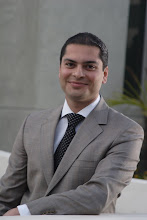While there is considerable enthusiasm surrounding every move made by rich Middle Eastern sovereign funds, capital movements in the opposite direction must not be overlooked. The Gulf Cooperation Council (GCC) Countries represent one of the fastest growing regions in the world.
While the US economy has stalled, the global economy has expanded at 4% to 5% annually for the past 5 years, according to the National Real Estate Investor. Worldwide, the number of high-net-worth individuals grew 6% in 2007 to more than 10 million. In the same period the number of people with more than $30 million in assets grew more than 8% to over 100,000. According to the World Wealth Report, published by Merrill Lynch and Capgemini, the assets of the wealthy are expected to grow by 7.7% annually to $59 trillion in 2012. Most of this growth is expected to be in rapidly expanding economies like those in the GCC.
As discussed in my previous posts, the regional governments have been very smart in how they spend the wealth generated from increased petroleum revenues. Considerable capital has been invested in critical infrastructure and industry, slowly but surely, transforming the region into a hub for trade, business, tourism, and finance.
The Goldman Sachs Group is one among many of the Western institutions that has been aware of such opportunities. In a recent move, the group launched a new proprietary fund to invest in select assets in the Middle East.
Showing posts with label dubai capital. Show all posts
Showing posts with label dubai capital. Show all posts
Thursday, September 11, 2008
Saturday, June 21, 2008
Diversification, Diversification, and then again Diversification
In the previous post, I mentioned how GCC States have fueled their exponential growth with an immigrant labor force that is now demanding more compensation and is creating an imbalance in the labor markets where the private sector is less inclined to hire nationals.
One possible solution to the problem, is already being investigated and, in some cases, implemented in the region. The basic assumption is that by investing their huge oil wealth in other industries and by simultaneous investment in educating and training their younger generation, the GCC countries can create industries that can be competitive on a global scale and can be run by the skilled force of their nationals.
A bold initiative along these lines is the Masdar Institute of Science and Technology by the Government of Abu Dhabi. It involves substantial investments aimed at fostering clean technology ideas from research to commercialization. Projects like this are channels to divert the oil wealth to alternative industries in which the regional countries can emerge as global pioneers and leaders. If such high risk, high reward projects come to fruition we might see a future Gulf that is way more diversified than the one we know today. It can be more than just one of wealthiest areas in the world in terms of its petroleum income and act as a power center for development and deployment of intellectual capital and breakthrough technologies. Only time can show us what the outcome will be.
One possible solution to the problem, is already being investigated and, in some cases, implemented in the region. The basic assumption is that by investing their huge oil wealth in other industries and by simultaneous investment in educating and training their younger generation, the GCC countries can create industries that can be competitive on a global scale and can be run by the skilled force of their nationals.
A bold initiative along these lines is the Masdar Institute of Science and Technology by the Government of Abu Dhabi. It involves substantial investments aimed at fostering clean technology ideas from research to commercialization. Projects like this are channels to divert the oil wealth to alternative industries in which the regional countries can emerge as global pioneers and leaders. If such high risk, high reward projects come to fruition we might see a future Gulf that is way more diversified than the one we know today. It can be more than just one of wealthiest areas in the world in terms of its petroleum income and act as a power center for development and deployment of intellectual capital and breakthrough technologies. Only time can show us what the outcome will be.
Subscribe to:
Posts (Atom)


